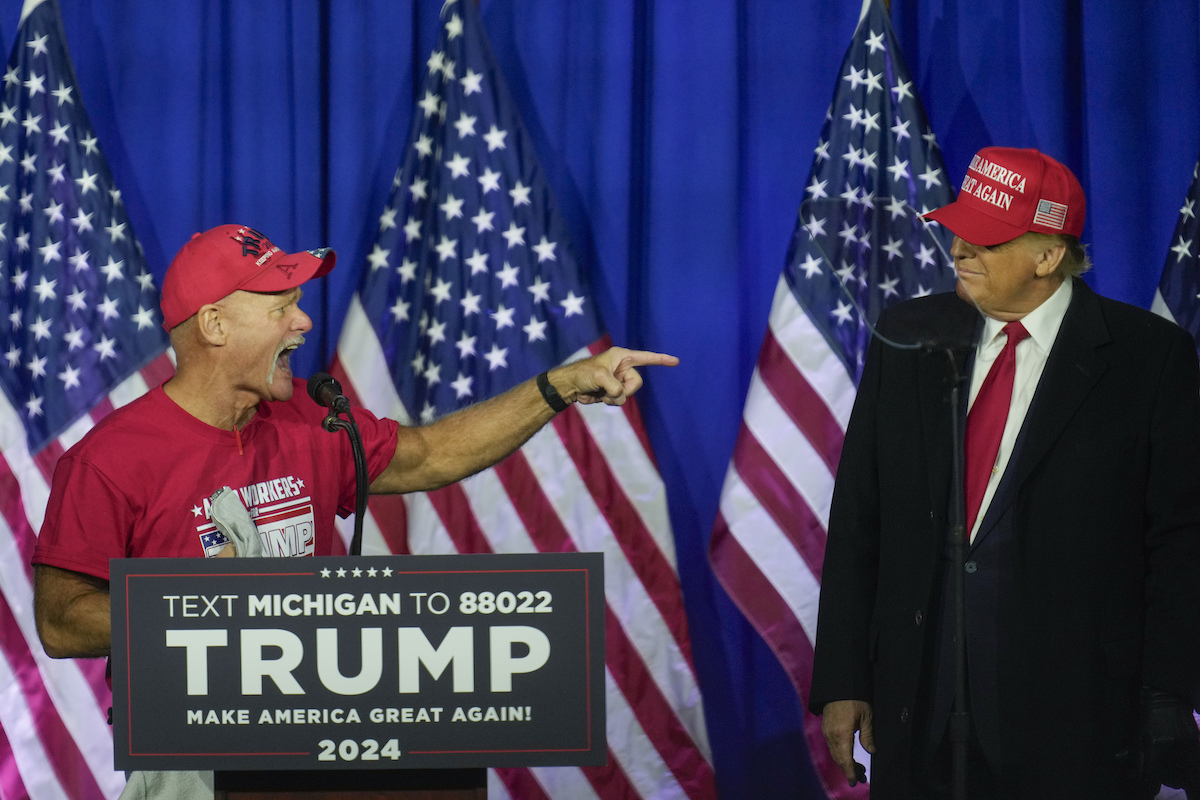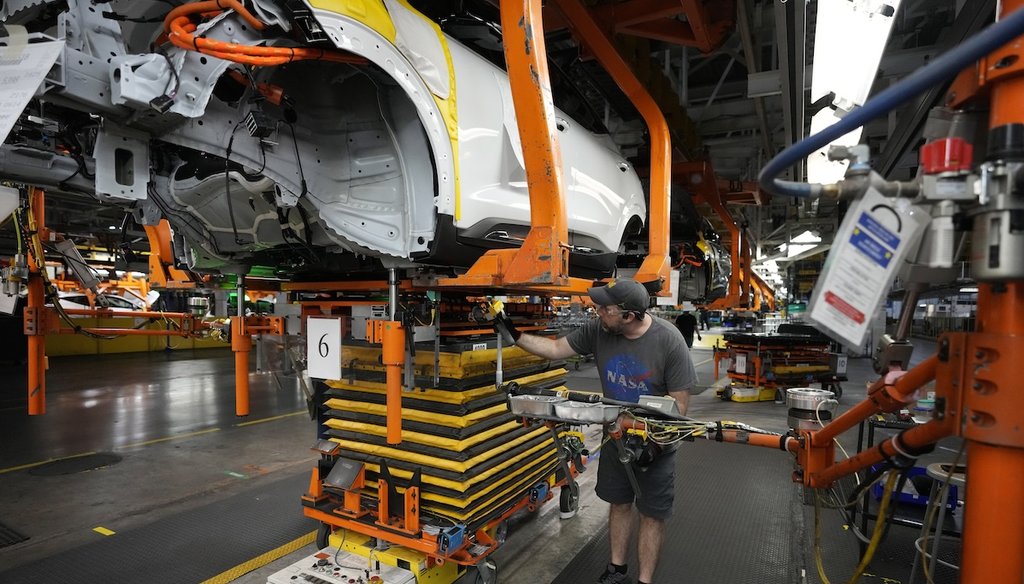

Our only agenda is to publish the truth so you can be an informed participant in democracy.
We need your help.


Assembly line worker Ryan Pontillo attaches an LG battery to a 2023 Chevrolet Bolt EV at the General Motors Orion Assembly, June 15, 2023, in Lake Orion, Mich. (AP)
During a rally in Waterford Township, Michigan, Republican presidential front-runner Donald Trump told voters their jobs were in danger. Immigrants who recently crossed the U.S. southern border would take the rallygoers’ jobs, he said.
"The biggest threat to your unions is millions of people coming across the border, because you're not gonna have your jobs anymore," Trump said at the Feb. 17 rally, later adding "The truth is, though, when you have millions of people coming in, they're going to take your jobs."
Michigan union membership is dropping, in line with national trends. But Trump is oversimplifying the role immigrants are playing in this complex U.S. employment landscape.
Economy and labor experts told PolitiFact immigrants who recently crossed the U.S. border likely aren’t taking Michigan’s union jobs. Instead, newly arrived migrants are likelier to work in jobs that Americans don’t want, such as day laborer positions. These aren’t union jobs.
Some labor experts have found a correlation between an increase in immigration and a drop in unionization. However, they said that’s not evidence that immigrants are "taking" union jobs. And immigration and labor policy specialists disagree about the reasons behind this correlation.
The number of employees in Michigan has grown over the past 10 years, yet union membership has dropped, according to the Mackinac Center for Public Policy, a conservative Michigan think tank. The number of employees has gone from 3.9 million to 4.4 million, while union membership has dropped from 631,000 to 564,000, the center reported.
One reason for the drop, said Illinois State University labor expert Victor Devinatz, is a 2012 Michigan right-to-work law that said nonunion employees in unionized workplaces could not be required to pay dues or join a union.
Economic researchers have found that these laws usually lead to decreased union membership. In 2023, Michigan repealed the right-to-work law.
These trends aren’t unique to Michigan, said Steve Delie, labor policy director at the Mackinac Center. Nationally, union membership is also dropping.
"Given that unionization has been trending negative for decades, it seems that workers have decided unions aren’t serving them well," Delie said. "Some workers may disagree with a union’s political views and activities, others may believe that they would do better bargaining on their own behalf."
But U.S. laws and employers’ actions have figured prominently in unionization’s decline, labor experts told PolitiFact.
Right-to-work laws, such as the one in Michigan, create "free riders," people who receive union benefits without having to pay union dues or fees, said Devinatz.
"Extremely weak US labor laws, employers’ virulent opposition to unions, globalization and technological change in the workplace have also negatively impacted union organizing efforts and have led to a decline in union density," Devinatz said.

Republican presidential candidate former President Donald Trump listens as an autoworker he invited to the stage speaks at a campaign rally in Waterford Township, Mich., Saturday, Feb. 17, 2024. (AP Photo/Paul Sancya)
There’s a clear correlation, experts told PolitiFact, between immigration and unionization; as immigration rises, unionization drops. But experts diverged as to why those numbers move in concert.
American workers abandon jobs when wages are lower and working conditions worsen, wrote Ruth Milkman, chair of City University of New York’s labor studies department, in a 2019 article. As a result, employers hire new workers, often immigrants, to take open jobs.
"Thus, the employment of immigrants did not cause the labor degradation in the industry," Milkman wrote of construction jobs. "On the contrary, it was the result of the employers’ anti-union campaigns."
Devinatz agreed with Milkman.
"The wave of immigrant workers, who often earn low wages, is a result of the neoliberal restructuring of the economy," he said. "Over the last several decades, employers implementing forms of subcontracting while simultaneously working to undermine unions have created much more demand for low-wage labor. This demand has resulted in millions of immigrant workers entering the lowest rung of the US labor market in order to perform jobs that US workers were unwilling to do."
Devinatz said that immigrant workers, especially those who are in the U.S. illegally, are less likely to join unions than their U.S.-born counterparts. Language barriers, employer intimidation and U.S. court decisions all factor in this, he said.
But a 2022 working paper from the libertarian Cato Institute found that immigration has contributed to the drop in union density. The paper’s authors said this is partly because immigrants are less likely to join unions and because immigrants diversify workplaces making it harder to get enough people together to begin collective bargaining.
"They have different interests. They have different desires, they have different demands. And so one of the effects of increased diversity is a lower rate of union density," said Alex Nowrasteh, Cato Institute's vice president for economic and social policy studies and one of the paper’s authors.
Nowrasteh said his paper isn’t evidence that immigrants take union jobs, as Trump claims. However, if immigration lowers unionization, then in the long term, as immigration increases, there could be fewer unions and therefore fewer union jobs.
"That doesn't mean, of course, fewer jobs overall. It just means fewer unionized jobs in the private sector," Nowrasteh said.
Historically, unions were hostile toward immigrants, Milkman said. But over the last few decades "there's been growing recognition that it's in the interest of U.S. farm workers to unite with, rather than try to exclude, immigrant workers."
Unemployment in the U.S. is historically low, said Nowrasteh. And employers say they’re in need of workers, according to the U.S. Chamber of Commerce.
"The latest data shows that we have 9.5 million job openings in the U.S., but only 6.5 million unemployed workers," wrote Stephanie Ferguson, global employment policy director at the U.S. Chamber of Commerce.
Immigrants are coming to the U.S. to fill open and available jobs, said Nowrasteh.
"There is not a fixed number of jobs in the United States economy," he said. So, as more immigrants come and purchase goods and services, they create more job opportunities "for others, including native born Americans."
Economy and labor experts said it’s highly unlikely that immigrants who recently crossed the U.S. border are taking Michigan union jobs. That’s because people who recently crossed the border illegally don’t have work permits to legally work in the U.S. Asylum seekers must wait six months after applying to become eligible for work permits.
Most immigrants who recently crossed the border are likely to work "in the ‘informal’ sector, getting paid under the table in cash rather than with paychecks, said Arthur Wheaton, director of labor studies at Cornell University. These jobs might include agricultural, construction or service work.
"Illegal immigrants do not tend to get higher paying jobs with benefits typically associated with unionized workplaces," Wheaton said.
This is particularly true in Michigan’s private sector, said Amelie Constant, a University of Pennsylvania labor economist. Most people work in the auto industry and many workers have lost their jobs because of automation, she said. The ones who remain "are rather skilled in the sense that they are the ones who manage the robots."
Union jobs are "more desirable. … People who already have those jobs are not giving them up. And if they're in a union, they can't be easily fired either," Milkman said. "So immigrants basically have access to jobs at much lower levels in the labor market, not those jobs."
In Michigan, Trump said "the biggest threat to your unions is millions of people coming across the border, because you're not gonna have your jobs anymore."
However, economy and labor experts told PolitiFact that immigrants who recently crossed the U.S. border illegally are unlikely to take union jobs because these jobs are highly competitive. Instead, they tend to work in nonunion jobs that Americans don’t want, such as day laborer positions.
Union membership has been dropping in Michigan and nationwide for years. And experts agree immigration and union membership numbers move in concert: as immigration rises, unionization drops. Some experts said immigrants have filled jobs left by union workers who disagreed with their employers’ labor practices.
One study found that increased immigration reduces union density because immigrants are less likely to join unions. In the future, this could mean that more immigrants would lead to fewer unions. However, one of the study’s authors said that’s not evidence that immigrants are "taking union jobs."
The statement contains an element of truth — there’s a correlation between union numbers and immigration — but it ignores critical facts about the nature of the job market and the pressures already facing union membership. We rate this claim Mostly False.
Brookings, The immigrant workforce supports millions of US jobs, October 17, 2022
Phone interview with Ruth Milkman, chair of City University of New York’s labor studies department, Feb. 21, 2024
Phone interview with Alex Nowrasteh, vice president for economic and social policy studies at the CATO Institute, Feb. 21, 2024
CATO Institute, Immigrants Reduce Unionization in the United States, Jun. 24, 2022
Phone interview with Amelie Constant, labor economist at the University of Pennsylvania, Feb. 21, 2024
Email interview with Victor Devinatz, Distinguished Professor of Management at Illinois State University,
Email interview with Arthur Wheaton, director of labor studies at Cornell University, Feb. 20, 2024
Email interview with Steve Delie, director of labor policy at the Mackinac Center, Feb. 22, 2024
Email interview with Charles L. Ballard, Professor of Economics Emeritus at Michigan State University, Feb. 23, 2024
The Guardian, Undocumented workers find new ally as unions act to halt deportations, Mar. 22, 2018
Dissent, Immigrants Didn’t Kill Your Union, Spring 2019
Klezmer Maudlin, What Rights Do Undocumented Workers Have?, Jul. 10, 2023
Pew Research Center, What we know about unauthorized immigrants living in the U.S., Nov. 16, 2023
Migration Policy Institute, Profile of the Unauthorized Population: Michigan, 2019
C-SPAN, Former President Trump Holds Rally in Waterford Township, Michigan, Feb. 17, 2024
In a world of wild talk and fake news, help us stand up for the facts.
